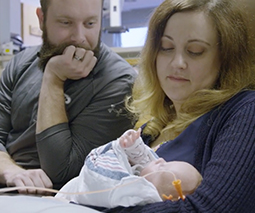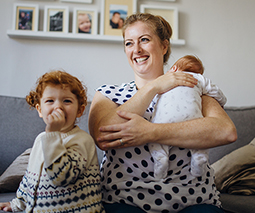The facts on Polycystic Ovarian Syndrome and how it impacts fertility

Polycystic Ovarian Syndrome (PCOS) is a common hormonal disorder that can affect fertility and make it more difficult to conceive. Here are some of the key facts to know about the condition.
What is PCOS?
Polycystic Ovarian Syndrome (PCOS) is a condition where the ovaries develop more follicles than normal each month. Unlike a healthy ovary, these follicles rarely grow to maturity or produce eggs that can be fertilised.
Women who suffer from PCOS tend to have higher levels of insulin, or higher levels of male hormones, known as androgens. While a certain amount of androgens is normal, too much can alter the ovulation cycle, making it much more difficult for a woman to conceive. Exactly why this hormonal imbalance takes place is unclear, however there is thought to be a link with insulin resistance.
It’s estimated that PCOS affects up to 18 percent of women of reproductive age. For some, it runs in the family, while for others, the condition may occur when they are overweight.
What are the symptoms?
If you have polycystic ovaries you may experience some of the following symptoms:
- Irregular or very infrequent periods
- Amenorrhoea – no period at all, for months or possibly even years
- Increased hair growth on the face or body due to a mild increase in testosterone levels
- Acne and hair loss
- Obesity or excessive weight gain as a result of hormonal imbalances and problems with sugar metabolism
- Difficulty falling pregnant due to irregular ovulation
- Women with PCOS may experience one or a few of the above symptoms
How is it diagnosed?
Early diagnosis of PCOS is essential, as it can help with managing symptoms, and also preventing long-term health issues such as diabetes. A doctor will diagnose PCOS based on your medical history, an ultrasound to check for polycystic ovaries, and a blood test to measure hormone levels.
How can it affect fertility?
Since the symptoms of PCOS include irregular or no periods, the chances of falling pregnant are naturally lower, and women are encouraged to seek medical support.
That said, polycystic ovaries are not always bad news. Many young women suffer with symptoms throughout their teens and twenties, but as a woman ages, the follicle number is known to drop, and the hormone imbalance starts to correct itself. For this reason, many women with PCOS end up having more eggs in their thirties and find their chances to conceive have improved.
How is PCOS treated?
There are a few options for treating PCOS. These include:
- Lifestyle modifications and weight reduction – eating a healthy diet and doing regular exercise is thought to have a positive effect on PCOS symptoms. Weight loss is also very beneficial for balancing hormones and can have a significant impact on PCOS.
- Medical treatment – this can include going on the oral contraceptive pill to regulate the menstruation cycle. Alternatively, some women may be given medication to block hormones like testosterone, to deal with the excessive hair growth. If a woman with PCOS is struggling with infertility, she may be treated with clomiphene citrate, or metformin to bring about ovulation.
Be sure to talk to your doctor about the best treatment for your condition.
Finding support and help
If you think you may be suffering from PCOS, reach out to any of the following health practitioners:
- Your GP
- A gynaecologist (for fertility) or endocrinologist
- A dietician
- A psychologist
- Jean Hailes for Women’s Health









